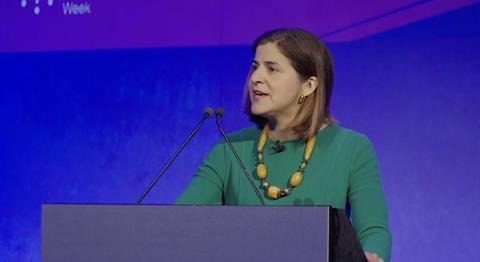With Sir Brian Leveson’s review of the Crown courts imminent, justice minister Sarah Sackman proposes a ‘bold modernisation initiative’ to reduce the backlog in cases. And in the civil sphere, she tells Michael Cross that technology can ‘democratise access to justice’

A boarded-up court building a stone’s throw from Sarah Sackman MP’s north London constituency office sums up the system of which she has found herself in charge. Barnet Civil and Family Courts Centre, currently closed for repair, ‘is in many ways a symbol of Tory neglect of our justice system, allowed to decline and deteriorate’, says Sackman. ‘The consequence of that, instead of receiving local justice, people in my constituency are having to travel miles and wait longer to resolve legal disputes and have their day in court.’
Predictably, the legacy of pre-2024 administrations crops up repeatedly in our interview at Petty France. But Sackman, a former Matrix Chambers barrister elected in last year’s Labour’s landslide and fast-tracked to the role of solicitor general and then to the Ministry of Justice as minister of state in charge of courts and legal services, is well aware that the government must now be judged on its own record.
The issue with the highest profile is the Crown court backlog. ‘We inherited a rising backlog of cases,’ says Sackman. ‘Victims of some of the most serious crimes, of the most serious sexual offences, are waiting two to three years for their day in court. We are letting down the public, be they victims of crime, those who are accused of a crime waiting to clear their name, we’re letting down the taxpayer.’
So, when can we expect tangible signs of improvement? ‘We are very clear that, given the extent of the backlog and the manner in which it is growing, only bold, fundamental reform will reverse the tide of incoming cases.’ Ideas for such reforms are expected from Sir Brian Leveson’s independent review of the Crown courts, which is expected ‘in the coming weeks’.
In the meantime, Sackman stresses, the government has not stood idly by. She lists the increase in the number of Crown court sitting days to the record of 110,000, the increase in magistrates’ sentencing powers and the ‘big additional’ investment in criminal legal aid. ‘So we are gripping the crisis but we also are clear that a bold modernisation initiative is going to be required to bear down on those delays.
‘The urgent measures we have taken are extensive, but they will not bring down the backlog in themselves. You’re only going to do this with a combination of mild structural reform, a big efficiency programme.’
Driving transformation
'My aspiration is that we restore public confidence in our justice system for people in their daily lives because justice is ultimately about a sense of security, in family relationships; in the ability to negotiate with an employer or an unscrupulous landlord'
And what of civil justice? Sackman cites her 15 years practising in public and planning law – and volunteering at a free legal advice centre – as evidence she knows what she is talking about. The month-long shutdown of Barnet Civil and Family Courts Centre in Finchley Central ‘is a massive motivator for me to drive transformation in our justice system, civil and family’.
Recalling her appearance before the justice select committee in its probe of the county court – and probably anticipating its findings – she describes the challenges as ‘extensive’.
‘Too much of the work of the court remains paper-based. It makes it so inefficient, the fact that it can take on average two years in London and the south-east to resolve commercial disputes between small businesses. You can’t enforce contracts and recover money owed… it impacts on people’s lives whether they find themselves in debt, or in difficulty in relation to questions of housing and family law.
‘As courts minister, my aspiration is that we restore public confidence in our justice system for people in their daily lives because justice is ultimately about a sense of security: in family relationships; in the ability to negotiate with an employer or an unscrupulous landlord; security in walking home at night.’
And how do we go about creating that?
Sackman, called to the bar in 2008, is obviously a digital native. She sees completion of the courts modernisation programme as essential. But that is evidently only a first step towards a more sophisticated civil system. Of the master of the rolls’ vision of an ecosystem of public and private online dispute resolution services taking most of the burden off the courts, she says: ‘I applaud his commitment and leadership in this area.’
She enthuses about new services for online housing possession claims and the introduction of digital pathways to mediation in civil money claims. ‘That is really exciting, because it is about reducing conflict and increasing people’s ability to resolve disputes and reach finality. But I think we’ve also got to be alive to the possibilities of innovation. I’m aware, along with minister [Lord] Timpson, of the use of AI to resolve low-value claims in countries like Estonia.’
Dynamic lawtech sector
Which brings us to LawtechUK, the MoJ-funded programme of support for startups whose life Sackman has extended to April 2026 with a £1.5m grant. ‘Fantastically exciting,’ she says, recalling leading a trade mission of legal tech firms and startups to Chicago and New York this spring. ‘What was clear was how dynamic and innovative our lawtech sector is, and how attractive to US and other international investors.
‘Some of these products are going to transform the way in which legal services are provided, and I hope in the fullness of time will be democratised so we can drive down the cost of delivering good-quality legal advice.’
Don’t we still have the problem that the bulk of legal tech investment today is going into the corporate sector rather than those crying out for access to justice? ‘We are internationally the jurisdiction of choice, a beacon of stability when it comes to commitment to the rule of law, an outstanding judiciary. And yet we have this challenge that all too often access to justice can be available to the very rich and the far less well-off who can access legal aid.
‘Technology has a huge role to play in terms of driving improvements and greater efficiency within courts and tribunals that can democratise access to good-quality legal advice. We can use technology to lower the cost of justice and make it accessible to absolutely everyone.’
She adds: ‘Access to justice is a form of empowerment. If you know your legal rights, not only can you enforce them in a court or tribunal, it affects how [you] engage in all sorts of relationships. If I’m trying to leave an unhappy marriage and I know what that would mean for me and my children; if I am caught in a tenancy agreement where the rent hike has been unfair, I can negotiate with my landlord knowing what my rights are, where I can get help if I need it and access to tribunal if I need to. And that alters the dynamic of society.
‘And that for me, with my background, is what this is all about. How can we harness our world-leading legal services, together with technology plus investment and transformation in our courts, to empower every single citizen.’
Does that mean pumping more into civil legal aid, where, even if still available, most rates have not risen since 1996? ‘Again, the inheritance from the previous government in the sphere of legal aid is one of under-investment and neglect… Not just in terms of lack of investment in fees but in the structure that underpins the fees. You will know that the Legal Aid Agency’s IT systems were recently subject to a criminal attack. But the vulnerability of those systems, the fragility of systems is due to the previous government turning a blind eye. And that impacts on the ability of civil legal aid providers to do their work.
‘I know that legal aid solicitors are spending up to 40% of their time navigating and engaging with a poor IT system. That is time they are not spending working as lawyers serving their clients. So one of my big focuses is how we invest and transform that system to make it fit for purpose.’
That is a big task, she concedes. ‘We’re already committing £20m to transforming that system. We can’t do it all in one go but that is exactly the aspiration. We have to totally transform the legal aid IT system, and that is about both the providers and the end-users. That’s a huge piece of work.’ She stresses also this year’s announcement of more funding for housing and immigration legal aid – ‘where the need is most acute’.
To return to LawtechUK: will the programme run past next year? Perhaps. ‘We are working out how to spend the settlement we’ve received and there are decisions to be taken. What’s exciting is how much lawtech supported and incubated by government is now thriving in the marketplace. Even without the need for government support.’
Hinting that at least some technology incubation work will be taken directly in-house, Sackman noted her ambition to create the ‘leading digital and AI department in government’. The MoJ already has an AI unit with the aim of creating a culture of testing new ideas – not necessarily on live cases, and without some of the usual Whitehall strictures such as procurement rules. ‘I think this unit is going to be really important in terms of absorbing exciting developments from the private sector but applying that to transformation of the system.’
One example is a promising MoJ-funded pilot project involving generating immigration tribunal transcriptions with AI. ‘If that’s successful, that has transformative potential right across our courts system.’
However, ‘in all of this conversation about driving innovation we need to remain focused on the end-user, the citizen,’ she stresses. ‘We talk a lot about how this technology can transform the profession. The question we should be asking is how is this going to transform the experience for the ordinary citizen?’
It was just such a question that took her into politics, Sackman says. ‘I volunteered at the free legal advice centre at Toynbee Hall in London’s East End, located near Commercial Street, under the giant towers of the City. What I saw there writ large was stark inequality and a place where lawyers were able to empower people… cases of eviction, abusive marriage. What it impressed on me was you do not have to just win the legal argument, you have to win the political one, and politics is about making the argument for how do we drive empowerment, fairness and a sense of social justice through institutions like the courts.
‘I think back to my career at the bar and the cases I’m proudest of, very often they were about holding the public sector, public bodies to account. Ultimately, it’s about making sure that those who didn’t have a voice in the system were given a voice. And that is very similar and has real resonance with the work I now do both as an MP and as minister for courts and legal services.’
So would Sackman have described herself as an ‘activist lawyer’?
‘I acted for claimants and respondents alike; I was on the Treasury panel. I did lots of cases for government. It’s really important that government and public bodies have the best advice. Public law is all about the citizen and the state, and unlike private law relationships it’s not a relationship you can walk away from. The state impacts on so many areas of our lives and how the state treats the citizen is so important, because in a democracy we govern by consent. And so to me, it was really important to act for local authorities and central government – I acted for this department in my time. It’s really important to give independent legal advice that allows other departments to take lawful decisions which give justice and fairness to the citizen. Both sides of the coin [should have] the best and most impartial legal advice.’




































2 Readers' comments